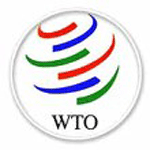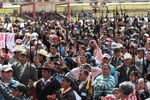Published on Tue, 2013-11-19 23:00
Speakers and attendees at the seminar said that the post-2015 Development Programme ought to include many areas neglected in the MDGs. Roberto Bissio, Social Watch, finds that the poverty threshold of $1.25 is too low and artificially reduces the the number of people who are recorded as living in poverty. It makes poverty invisible in rich countries and pays no attention to the shame and suffering it causes throughout the world. |
Published on Fri, 2013-11-15 08:33
We, as members of the global civil society, urge the Director-General of the World Trade Organisation, Roberto Azevedo, and heads of member states, to take the issue of food security in developing countries as a matter of serious and immediate concern, and not to render the G-33 proposal on public food stockholding a travesty by asking developing countries to agree to the current text on the peace clause. |
Published on Thu, 2013-11-14 13:45
Representatives of the Latin American Coordination of Rural Organizations (CLOC- Via Campesina), and the Center for Legal and Social Studies (CELS) raised the question of the Economic, Social and Cultural Rights (ESCR) of the rural communities of Latin America and the Caribbean at a regional hearing before the Inter-American Commission on Human Rights (IACHR). The hearing took place in Washington in the 149th regular period of sessions of the IACHR. The presentation was accompanied by a report which describes the obstacles to the full enjoyment of the economic, social and cultural rights of the rural communities in Latin America, with a strong focus on their rights to food and territory; the particular situation of rural women; and the persecution and criminalization of the rural communities struggle. |
Published on Wed, 2013-11-13 22:59
Do you know how much your government collects in taxes? How much are wealth and incomes taxed, as opposed to wages or consumption? Does the government gather information on the share of taxes paid by different social groups (e.g. women/men, rural/urban, different ethnic groups)? Is the revenue collected enough to raise adequate resources for the realization of human rights? |
Published on Wed, 2013-11-13 22:25
Consistent with the Millennium Declaration’s recognition that all States “have a collective responsibility to uphold the principles of human dignity, equality and equity at the global level,” Millennium Development Goal 8 (“MDG 8” or “Goal 8”) contains a number of specific commitments on the sort of international cooperation required on areas such as aid, trade and debt. But how much did MDG 8 respond to human rights imperatives and how far did its implementation go in promoting human rights? What historical and legal trends were the backdrop to MDG 8 and what hope can we bear for the future as the international community evaluates a potentially new generation of development goals? |
SUSCRIBE TO OUR NEWSLETTER







